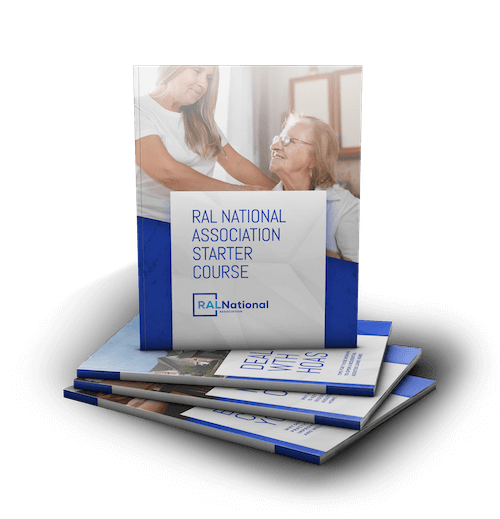With the hustle and bustle of the holidays it can be easy to miss signs that seniors in residential assisted living aren’t eating enough or getting the right nutrition to help them stay healthy.
There are several reasons for poor nutrition amongst elderly individuals. Everyone understands the importance of good nutrition. Yet, most people struggle to do the right thing.
Quality caregivers understand that seniors require good nutrition to sustain health and overall well-being.
The Challenge: What does a caregiver do when the senior for whom they care resists eating? The reasons for avoiding mealtime are numerous, but the leading causes include digestive issues and a general loss of appetite.
This is where proper nutrition becomes even more important, when eating becomes infrequent. Also, understanding why the lost appetite in seniors is vital.
THREE MAJOR CAUSES OF LOSS OF APPETITE
- Medications
It is common among caregivers to observe, if not administer, multiple medications to seniors. Many seniors consume 4 or more medications on a daily basis. Nearly 40-percent of seniors consume more than 5 medications daily. Studies show that seniors who use a pill organizer forget medications less often.
While some of these medications treat chronic conditions, others manage the side effects of the medications which treat chronic conditions. Yes, it can be a vicious cycle.
Have you seen modern drug commercials?
Have you ever been petrified by the list of deadly side effects? Most patients never experience those rare side effects, but many do experience a leading side effect, which is often overlooked – appetite suppression or loss of appetite.
Ensuring that residents are consuming healthy foods, full of nutrition while consuming 4 or more medications daily is a difficult battle if the medication which treats a chronic condition suppresses the appetite. Many caregivers have commented, “Ms. Jones consumes more medicine than food.” Medication does not nourish.
What does a caregiver do to ensure the one for whom they care is well nourished? How can this be accomplished while preserving life? - Dulling Senses
Seniors often report a reduction in smell. Sometimes this is due to medication usage, but it is also apparent with the aging process. A loss of smell can also create a loss of appetite. Think about it. Have you ever driven by a McDonalds and suddenly craved french-fries? How about a Burger King when they are grilling Whoppers?
If smelling has diminished, appetite will as well. Smell is also associated with taste. If taste is perverted by medication or diminishing, eating can seem worthless. The enjoyment of food has been taken. Therefore, small meals are vital.
Also, even if smell and taste are compromised, thirst does not go away. Therefore, fresh juice and smoothies are most helpful.
Nutrition can be achieved even in this circumstance.
If the dulling of smell and taste is a medication problem, urge your residents and their families to look at alternatives. Remember, proper nutrition is the basis of all medical treatment. - Physical Complications
Dental challenges for seniors can be a struggle to say the least. If teeth have been lost or dentures are uncomfortable, a loss of appetite can occur. Sometimes, it also means they require a tooth implant, dental fillings or any sort of Restorative Dentistry Treatments, so that they can eat both cold and hot food, without trouble. A CEREC same day crown may also be recommended if they have a severely damaged tooth that prevents them from eating comfortably. If you want to get in touch with the best orthodontist in Garden City, Winnipeg, you can cick here!
Additionally, embarrassment associated with dentures can cause seniors in residential assisted living to resist eating and they have to undergo a virtual consultation to figure out the problem.
Other complications associated with dentistry such as:
- Gingivitis
- Oral Sores
- Exposed nerves
- Cavities
The best solution, while a simple one in concept, can be a challenge in practicality. Seniors need a Geriatric Dentist.
These specialists understand what and how to treat seniors, especially those with dementia. You can make an appointment at the uk smiles in Turkey to get help with your teeth and gum issues.
Therefore, seek help quickly and maintain proper dental health.
HOW TO ENCOURAGE AGING RESIDENTS TO EAT
As a professional caregiver, you must realize many residents of residential assisted living homes are often placed in your care due to poor nutrition. Therefore, wise strategies must be employed to ensure the resident is properly cared for and nourished.
- Serve multiple small meals. These meals should be nutrient-dense snacks spread throughout the day.
- Fresh juice is incredibly nourishing and is easy to consume, even when not hungry.
- Smoothies. Who doesn’t love a banana strawberry delight from time to time? Add some healthy coconut or olive oil for good fat, and your resident can easily get the nourishment they need.
What must be avoided is pressure, badgering, argumentation surrounding mealtime. Eating should be a snack time, not a conventional mealtime. The caloric intake will increase, nutrition will increase, and overall wellness will improve.
The resident will become more jovial, stronger, and more engaged. Engagement drives activity and creates hunger. Reverse the vicious medication cycle with a wise snack cycle.
BASIC NUTRITION REQUIREMENTS FOR RESIDENTS IN ASSISTED LIVING
Now that we’ve addressed the problem, let’s ensure the solution is worth the work. Seniors have specific nutritional needs.
Vitamins, minerals, protein, fibers, and fluids are all essential. Fluid intake is important to consider, especially with medication usage.
Vitamins and Minerals
Vitamins needed to ensure proper bodily function include:
- Calcium – essential for bone health
- Vitamin D – essential for brain health
- Iron – essential for many bodily functions
- B12 – essential for brain health and energy
While all of these vitamins are available in a multivitamin, they are equally as accessible in juices and smoothies, which are more natural sources with better absorption. Therefore, fresh juice and smoothies that can be consumed throughout the day balanced by water intake will result in a strong healthy senior. Vitamin D is one that food does not offer, so a supplement is essential. A chewable is a great option and comes in Grape Flavor, too.
Protein
Absolutely, an essential protein is vital for life. Proteins build cells. Cells build, repair and sustain organs. Organs sustain life. Enough said. Protein also builds and preserves muscle, immunity and tissue growth, which is vital for the healing of any wound or ulcer. So, get protein into your seniors. If meat is the only means, that can be tough if a resident doesn’t want to eat. Therefore, put it in a shake. Protein shakes can be flavored with fruit, low-glycemic for diabetics, and deliver a protein punch that is powerful for the body. The protein source depends on any dietary restrictions. Protein can be found in the form of Whey, Yogurt, Fermented Pea, or Egg to name a few. Bone Broth powder with protein is powerful and very useful especially in the area of minerals. Once restrictions are determined, choose a safe palatable source for your senior to consume.
Fiber
The digestive tract of a senior tends to move slower. Fiber is essential to prevent constipation, which can be quite problematic in a senior. Therefore, include a scoop in a shake. Most fiber is tasteless and works just fine. Ensure that your residents are consuming water, which is essential for fibers flushing ability.
Fluids
Speaking of water, it is important that seniors consume approximately 64 ounces of fluid on a daily basis. This prevents dehydration, which will cause a spiraling down of health and wellness. Dehydrated seniors develop a host of medical challenges including:
- Fainting
- Urinary tract infections
- Constipation
- Disorientation
- Irritability
If these are other uncustomary behaviors or conditions manifest suddenly, the cause may very well be dehydration. If juicing and providing smoothies for seniors in your residential assisted living home, achieving this requirement is simple.
TIPS FOR CREATING A FORTIFIED DIET FOR ELDERLY LOVED ONES
It’s time to talk about recipes. What and how can you get good nutrition in your residents?
- Juicing
- Juicing for seniors is a great way to get vitamin dense nutrition. Here are a few options:
- Carrot, Apple and Orange.
- Apple, Berries and Lemon
- Spinach, Apple, Celery, Parsley, Beets and Lemon
- These juices may seem simple, and they are, but they are powerful. They are full of vitamins and essential minerals as well. If glycemic control is an issue, the latter two are great.
- Include fats with this juice as well to increase caloric intake. Try adding:
- Coconut Oil
- Olive Oil
- Avocado Oil
- Juicing for seniors is a great way to get vitamin dense nutrition. Here are a few options:
While juicing for your residents, caregivers can also have a glass for self-care. Maybe sit and drink together. Everyone loves company while snacking.
- Smoothies
- Making smoothies is fun and drinking them even better. What Baby Boomer wouldn’t love a milkshake?
- 4-6 oz. of milk (cow, almond, coconut)
- 4 oz. of water
- 2-4oz of ice
- 1 banana
- 4-5 strawberries
- 1 scoop of protein (whey, egg, fermented pea, vegan) & fiber
- Blend and add a straw. Happy sipping.
- Here’s another…
- 4-6 oz. of milk (cow, almond, coconut)4oz. of water
- 2-4 oz. of ice
- 1 cup of spinach
- 4-5 pineapple chunks
- ½ cup of blueberries
- 1 scoop of protein (whey, egg, fermented pea, vegan) & fiber
- 1 TBSP of oil (coconut, olive, avocado)
- Blend and add a straw
- Making smoothies is fun and drinking them even better. What Baby Boomer wouldn’t love a milkshake?
These are just a few recipes. You may create whatever you desire, as long as your residents enjoy it and it provides good nutrition. Some seniors love peanut butter, so that can also be a source of fat in smoothies.
EATING HEALTHIER FOR BETTER MEDICATION MANAGEMENT
Caring for an aging resident who is dealing with appetite challenges, regardless of the cause, can feel like a struggle, but it doesn’t have to be. Seniors want to be strong. They want to be healthy. They just need new avenues to achieve it.
It’s important for people to eat whole food, but do not be tricked into thinking that is the only way to nourish the body.
Liquid food is readily available for absorption, easier to digest, and improves health quicker.
Visit www.RALNA.org to learn more about owning and operating a successful assisted living home.
Membership with the Residential Assisted Living National Association will empower your business with the support needed from blogs, legal support, group discount purchasing and so much more.











